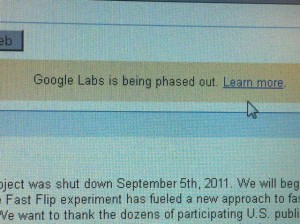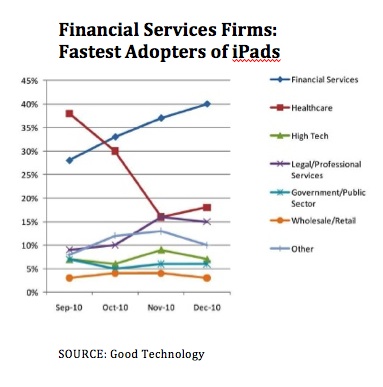
Can Google Lose its Labs Without Losing The Values That Helped them Succeed?
I had hoped that my second blog post for FirstRain wouldn’t, once again, be about Google (you’d think that we’d all be sick of hearing about Google 24×7? And we may be, but sick in that ‘I-still-must-tune-in-and-see-what-is-happening-kind of way’ …). Still, I found myself captivated by their announcement this summer that they would phase out a major program called Google Labs by the end of September. And as we’re now approaching that shutdown date, it’s gotten me thinking again about this interesting decision.
For the most part, I’ve always been quite impressed by Google. I am a long term Gmail user (Gmail has its own Labs, as does Google Maps) and I am still a firm advocate that Google+ will eventually be big (especially after seeing all the complaints of Facebook’s new design on my Facebook newsfeed the past two weeks). Google has launched so many winning products over the years that I was shocked to hear that such a successful and interesting part of Google was to be phased out.
For those unfamiliar with Google Labs, it was a playground for users who are interested in trying Google prototypes and providing feedback directly to Google Engineers. It allowed the public to freely experiment with pre-released Android apps, Google Maps experiments, Google Search betas and much more. Although, not all of these prototypes prove to be effective, it is still a nice way to get the public involved in ‘designing’ and evaluating some of Google’s most popular ideas.
So exactly why has Google decided to pull the plug on this program, when it seemed so many people (albeit, adventurous tech people) were benefiting from it? According to Bill Coughran, Google’s Senior VP for Research and Systems Infrastructure, Google is now beginning to prioritize their product efforts more strictly. And although some of their biggest products had started in Google Labs, they’re now focusing much more of their efforts into dominating the products already in progress, such as Google+. Google has decided that ultimately there are too many ‘small’ projects and they want to channel the company’s focus on the larger and, *cough*, more lucrative options. By simplifying and focusing Google’s product line, Coughran said, more “extraordinary opportunities are ahead”.
The Google Labs decision is more than just phasing out a neat program, however. The last few years were spent testing potential golden projects. And they did this successfully. Google beat out competitors like AOL and Yahoo in numerous departments such as search, smartphones and Email (does anyone use AOL for email anymore?). And Google Labs has significantly helped develop some of these platforms. But the need is no longer necessary as the trial period is officially over. What’s interesting is what a signpost this is for where Google is in their lifecycle as a company. Instead of the fun, pioneering tech startup playing in many sandboxes, looking for ideas and doing no evil, they’ve now evolved into a focused and mature company that—for the most part—knows its market, where the money is, and is coalescing around key products like Search, Gmail and Google+.
Now that the deadline is upon us, I was curious to check out the status of Google Labs, especially since I haven’t come across much recent news about the Google Labs termination. If you go to GoogeLabs.com, they inform users directly (no sugarcoating) that the Google Lab’s program is being phased out. Also, it is obvious that many of the experiments have been visibly shut down.
Not all of Google Labs’ programs will completely disappear. Google claims that they will be integrating some of their better prototypes into many of their already existing experiments but the actual “Labs” name will be retired. The real question for Google now, is how they can retain the spirit of Google labs—that open sense of valued community feedback in a beat environment, now that their flagship vehicle for those values has been lost.







